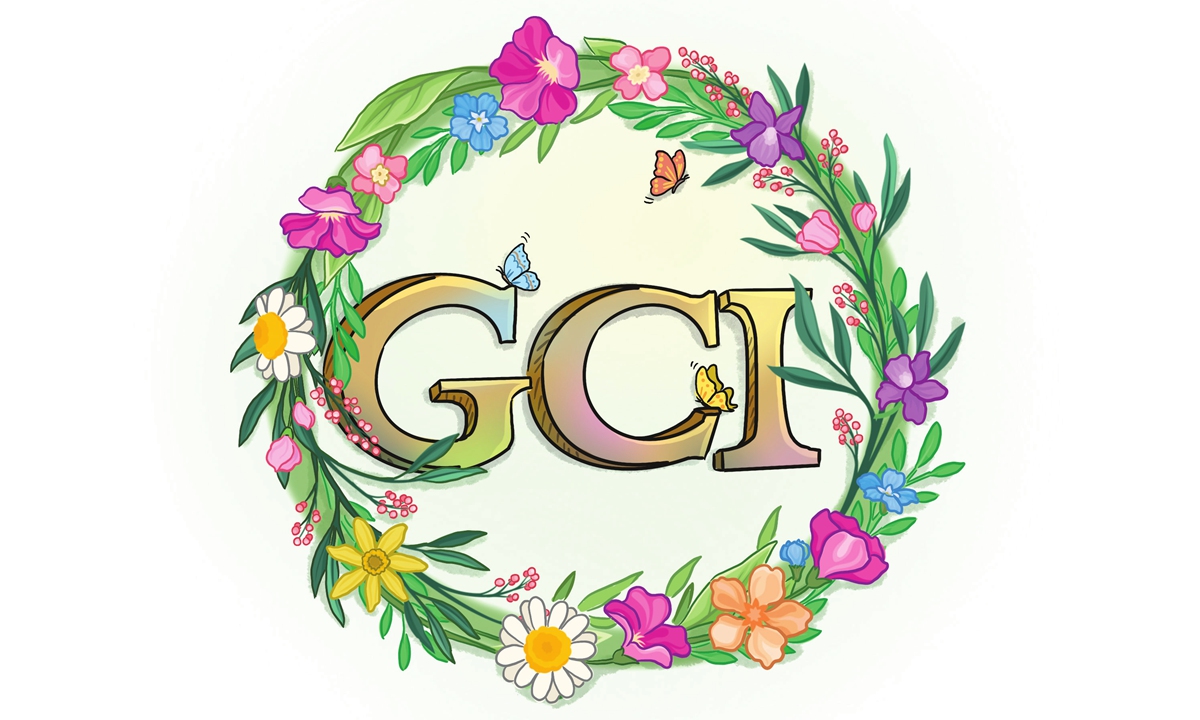
Illustration: Xia Qing/Global Times
One year ago, General Secretary of the Communist Party of China (CPC) Central Committee and President Xi Jinping attended the CPC in Dialogue with World Political Parties High-level Meeting in Beijing on March 15, 2023, and presented the Global Civilization Initiative (GCI) in his keynote address. This presentation disclosed the third strategic concept proposed by the Chinese leader after the Global Development Initiative (GDI) that was made public in September 2021 and the Global Security Initiative (GSI) announced in April 2022. The three programmatic concepts reflect the new vision of China's foreign policy in the new international environment of the 2020s and further elaborate the more general Chinese foreign policy doctrine of "a global community of shared future."
Although the GCI does not directly challenge the Western "rules-based international order" paradigm, it has still faced harsh criticism from the West, similar to the two earlier initiatives. Over the past year, there have been numerous statements arguing that the GCI is fundamentally flawed and indefensible because it blurs the red line between "democracies" and "autocracies" by emphasizing the importance of history, traditions and culture.
This reaction is disappointing but not surprising. In the current global information war, any idea originating from Beijing is likely to be met with predominantly critical and often unfair reactions in Washington and other Western capitals. The immediate question in the West is not "How could we work together on this idea?" but rather "What's the catch?"
However, brushing aside all the politically charged and often shallow criticism of the GCI, one must admit that the initiative raises a number of serious issues regarding the desirable future of the international system as well as the future of mankind at large. Let's outline the most evident issues.
First, how can we define the elusive notion of "civilization"? There is no doubt that, for example, China and India qualify as full-fledged civilizations, but what about other nations or groups of nations? Indeed, some potential contenders for "civilization" status might have limited territory, small population or short histories that make it difficult to classify them as civilizations. Additionally, some nations are so intertwined with each other that it is challenging to distinguish where one civilization ends and another begins.
On top of that, what should be the destiny of smaller nations that are clearly not in a position to get to the level of global civilizations, but have their own unique features and foreign policy aspirations? Should they align themselves with larger, more powerful neighbors through diverse forms of bandwagoning, or should they forge their own non-civilizational, transactional alliances based on opportunism?
The GCI underscores the importance of respecting history and tradition, which should not be regarded as an obstacle to social and economic modernization, but rather as an essential modernization driving force. This is a very appealing approach to anyone who cares about their identity and is not ready to become an atomized individual in a fully globalized "flat" world. Still, history tells us many stories about how hard it is to keep a proper balance between tradition and innovation, between self-preservation and modernization.
Another important issue is the difference between humanitarian contacts that the GCI strongly supports and direct interference in the domestic affairs of other states that the GCI explicitly discourages. It is important to be able to distinguish between the two.
At the end of the day, the most important question related to the GCI is how one understands modernity. If one assumes that there is only one model of true modernity (the Western or, more specifically, the American model), then the differences between civilizations may be seen as manifestations of archaism and backwardness (for instance, incomplete modernization). These remnants of the past can be tolerated for some time, but at the end of the day, they should be resolutely swept away by the magic brumes of liberalization and globalization. Such views were popular 20 or 30 years ago, but today, with all the problems facing the West, they appear not only arrogant, but also preposterous.
If the differences between civilizations are regarded as precious assets of mankind that make all of us stronger, more creative and more resilient, then they should be preserved and promoted. Any complete merger of civilizations into one entity would dramatically reduce the complexity of the global society, which would, in turn, inevitably increase the scale of various risks and uncertainties. The ongoing outburst of cultural, ethnic, regional, national, religious and other group identities is nothing but a natural reaction of the complex global social system to push toward excessive simplification.
To combine a variety of diverse elements in a common global governance project is not easy. It is like building a house using not a set of standard premanufactured bricks, but a pile of wild stones, where each stone has a unique size and shape. One needs a lot of glue to keep the stones together. International law could serve as this glue, provided that no double standards are applied and that all civilizations are treated equally.
Under no circumstances should the pluralism of civilizations justify gross violations of human rights, reckless approaches to the environment, or outright violations of universally accepted norms of responsible state behavior. However, in the classroom of civilizations, there can be no omniscient teachers and obedient pupils. All of us have to learn from each other and assist each other in the uneasy process of maturing as a civilization. The GCI provides valuable guidance on how this process of mutual learning and mutual assistance should develop further.
The author is the academic director of the Russian International Affairs Council. opinion@globaltimes.com.cn




